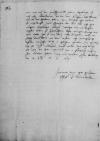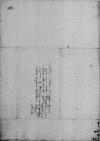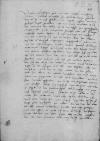Das E(wer) H(erlichkei)t ir ⌊⌋ vor diessem ⌊⌋, das uns gestriges tages gewordenn, / nicht ane ursach vorendert unnd das, was uns der edle unnd ernvheste herr ⌊Georg Schefecke⌋, burgermeister, unser vielgeliebter schwager, vonn E(wer) H(erlichkei)t wegen angesagt lassenn abgehenn, ist nicht unnutzlich. Wol vorstehenn dan die ⌊⌋, die uns ⌊ein ersam rath⌋, / den andernn tag dits zu ⌊Dantzigk⌋ ausgangenn, zugeschriebenn, habenn wir mit dem hochwirdigenn unsern liebenn herrenn brudernn ⌊Tidemanno, bischofe zu Colmese⌋, under uns bedocht unnd aus vielenn ursachenn befundenn, das solcher zug nach ⌊Litten⌋ eher das antwort vonn der ⌊altenn ko(nigliche)n m(aieste)t⌋ uff unser beider ⌊⌋ wirt ankome(n) sich nicht hatt wollenn schickenn. Das sich aber E(wer) H(erlichkei)t des weges in namen eines ⌊ersamen raths⌋ zu der ⌊jungenn ko(nigliche)n m(aieste)t⌋ will begebenn, / sehe wir vor gut an / unnd das es nicht anders, dan der gutenn ⌊stadt⌋ zum bestenn kan gedeien. Derhalbenn, wie E(wer) H(erlichkei)t bogert, habenn wir hochgemelter ⌊ko(nigliche)r m(aieste)t⌋ unnd derselbtenn vornembstenn ⌊secretario⌋ ⌊⌋, wie E(wer) H(erlichkei)t aus beigelegten copeienn wirt vorstehen, / dabey auch angezeigt, / was den herren woywoden zu Plotzko mit der hauptmanschaft ⌊Meve⌋ angeht, wie eingelegte abschrieft mitbringet, bittende, E(wer) H(erlichkei)t wolde ir dem lande zum fordernus diesse sache lassenn bevolenn sein unnd alles dabey thun, was muglich. / Das aber E(wer) H(erlichkei)t so lange solde vorziehenn zur ⌊Wildenn⌋, / bis das von der ⌊alten ko(nigliche)n m(aieste)t⌋ antwort widerkom, duncket uns nicht gerathenn, wie wirs achtenn, / es mochte sich etwan zu lange vorziehenn. Unser bote, den wir denn XXVIII Maii vor dem negstenn, den wir vonn hinnenn balde nach E(wer) H(erlichkei)t vorrucktenn  APG 300, 53, 269, p. 112 vonn uns nach dem ⌊Preuschenmarckt⌋ / habenn abgefertiget, / ist noch nicht widerkomen, / der dan denn funftenn dits monats, wie wir des schreibenn habenn, / von ko(nigliche)n hofe ghen ⌊Crakaw⌋[1] ist angelanget, / vonn schwacheit aber ⌊ko(nigliche)r m(aieste)t⌋ nicht hatt mugen abgefertiget werdenn, / welches auch mit diessem negstem botenn ist zubefurchtenn. / Nichts wenigers kumpt uns was mitler zeit zu, / das E(wer) H(erlichkei)t notig zuwissenn, / wolle wir solchs derselbtenn mit denn erstenn nicht unangezeigt lassenn. Wunschen E(wer) H(erlichkei)t in gotlichenn genaden / eine gluckselige hin und widerfart / unnd wollen uns auch E(wer) H(erlichkei)t bit nach die iren, / worinne(n) wir in forderlich mugenn sein, / bevolenn habenn. /
APG 300, 53, 269, p. 112 vonn uns nach dem ⌊Preuschenmarckt⌋ / habenn abgefertiget, / ist noch nicht widerkomen, / der dan denn funftenn dits monats, wie wir des schreibenn habenn, / von ko(nigliche)n hofe ghen ⌊Crakaw⌋[1] ist angelanget, / vonn schwacheit aber ⌊ko(nigliche)r m(aieste)t⌋ nicht hatt mugen abgefertiget werdenn, / welches auch mit diessem negstem botenn ist zubefurchtenn. / Nichts wenigers kumpt uns was mitler zeit zu, / das E(wer) H(erlichkei)t notig zuwissenn, / wolle wir solchs derselbtenn mit denn erstenn nicht unangezeigt lassenn. Wunschen E(wer) H(erlichkei)t in gotlichenn genaden / eine gluckselige hin und widerfart / unnd wollen uns auch E(wer) H(erlichkei)t bit nach die iren, / worinne(n) wir in forderlich mugenn sein, / bevolenn habenn. /
 APG 300, 53, 269, p. 112 vonn uns nach dem
APG 300, 53, 269, p. 112 vonn uns nach dem 

